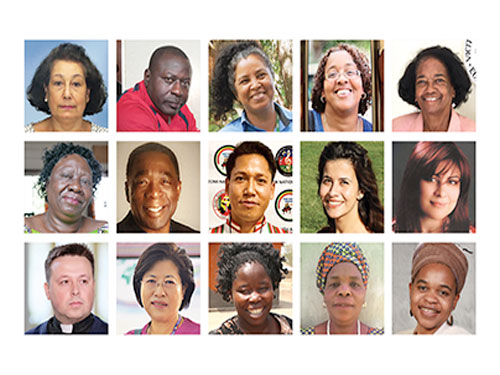Presbyterian Peacemaking Program for 2019 has assembled 15 International Peacemakers
by Rich Copley | Presbyterian News Service

LOUISVILLE — We see headlines every day from nations around the world telling us about crisis and conflict — and stories of people living in and overcoming extraordinary circumstances.
This fall, your church or presbytery can hear directly from Palestinians working for peace and justice in Israel-Palestine, a church worker in the Democratic Republic of Congo helping with people who have HIV/AIDS, a Korean minister working for reunification of the Korean peninsula, a minister of Latvian and Russian-German descent based in Moscow, a social worker in South Sudan who lived through her own trauma and is now helping people in her nation live through theirs, and many more.
Those are snapshots of some of the 15 International Peacemakers who will be traveling to Presbyterian churches and related organizations throughout the United States from mid-September to early October as part of the 2019 International Peacemakers, an annual program presented by the Presbyterian Peacemaking Program. This is the 35th year of the Peacemakers’ visits, which have brought more than 300 people from 60 countries to the United States to share their unique experiences in global peace and justice work.
While it has been around for more than three decades, the program is also ideally aligned with the Presbyterian Church (USA)’s new Matthew 25 Invitation to congregations to build congregational vitality, dismantle structural racism and eradicate systemic poverty.
“Collectively, they are witnessing to the Matthew 25 church,” says the Rev. Carl Horton, coordinator of the Presbyterian Peacemaking Program. “We’ve got someone working to provide clean water to the thirsty. We’ve got those providing food to the hungry. We’ve got someone welcoming the migrant ‘stranger’ in Europe. We’ve got people visiting those imprisoned in societal structures of racism and oppression.
“Taken as a whole, this is a great group of people to help us learn more about what it means to be a Matthew 25 church, each one doing a different aspect of that.”
With 15 peacemakers, this year’s class is a third larger than the 2018 group of 10. Horton says the Peacemaking Program had a lot of great suggestions from mission co-workers and others who gave input.
“We look for people who have their sleeves rolled up and are on the ground doing the work,” Horton says. “They are engaged in peace and justice work. These are people working with marginalized populations, working with people at risk, working in contexts of speaking truth to power and challenging authorities – doing frontline justice work.”
Horton points out that a number of Peacemakers are people that participants in the Peacemaking Program’s Travel Study Seminars and bi-annual Mosaic of Peace Conference in Israel and Palestine have encountered or will encounter in their home areas.
Peacemakers are available to visit around the country from Sept. 13 to Oct. 7. Visits are coordinated with mid-councils — synods and presbyteries — and can include visits to churches, seminaries, colleges, universities and similar institutions. Visits generally last three to five days, but they can be extended as needed.
Click here for the application to request a Peacemaker.
“The power of the program is the personal relationship that is forged between the Peacemaker and the people who hear from them,” Horton says. “It’s a first-hand account of the peace and justice work that’s being done around the world. It builds not only personal relationships, but in some cases sister churches have emerged out of these, presbytery partnerships have emerged — a lot of times our mid councils and congregations that hear from a Peacemaker want to show support.”
Horton does note that the visits are not fund-raising tours, though a desire to support peacemakers in some tangible way often emerges.
“It is educational, it’s informative, it’s intended to teach and widen people’s understanding. It’s not to collect money,” Horton says. “But the reality is when our members hear what people are doing around the world –—this year they’re going to hear examples of being a Matthew 25 church — they will be moved and want to partner with them, and all these Peacemakers are partners of the Presbyterian Church.
“So, there are ways spiritually, tangibly and materially they can support these ministries.”
Click here to give to the International Peacemakers program.
![]() You may freely reuse and distribute this article in its entirety for non-commercial purposes in any medium. Please include author attribution, photography credits, and a link to the original article. This work is licensed under a Creative Commons Attribution-NonCommercial-NoDeratives 4.0 International License.
You may freely reuse and distribute this article in its entirety for non-commercial purposes in any medium. Please include author attribution, photography credits, and a link to the original article. This work is licensed under a Creative Commons Attribution-NonCommercial-NoDeratives 4.0 International License.